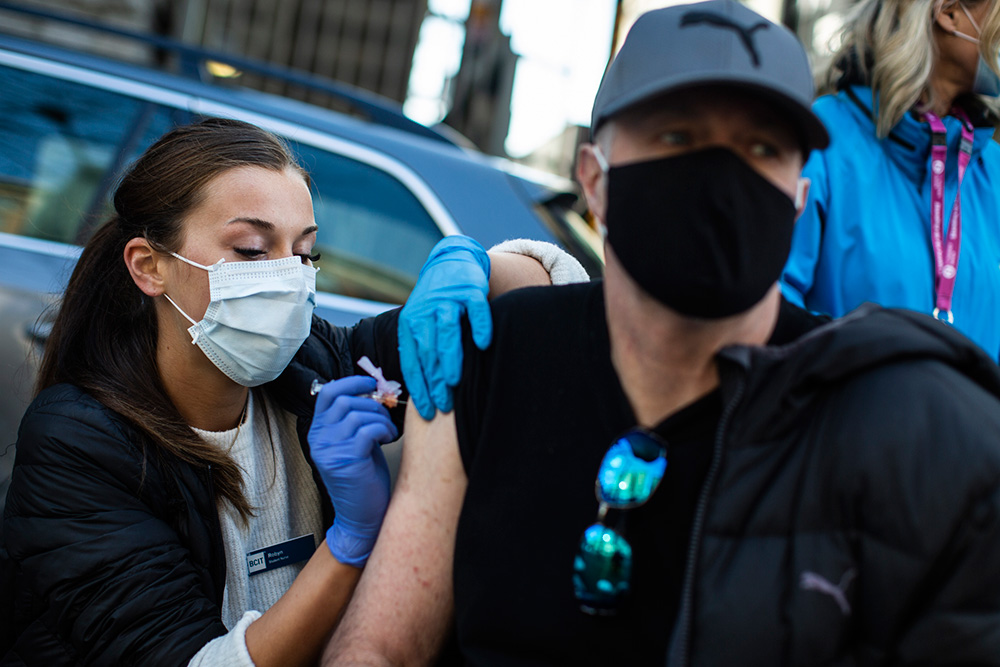The medical experts leading the fight against COVID-19 have become a cornerstone in the lives of Canadians for the past year. Dr. Bonnie Henry and Dr. Theresa Tam are two of the names and faces we have come to know in the pandemic response.
Yet one of our greatest tools in gaining ground against the pandemic — the mass vaccination campaign Canada is set to roll out — will have someone more anonymous on the frontlines.
When it comes time for you to roll up your sleeve, nurses will be doing the immunizing.
Vaccines are important. They save lives. And while vaccines are not a cure, they are a crucial preventative strategy used to curb the spread of a virus within populations.
Administering vaccines takes hands-on expertise, to be sure. But there is another aspect inherent in vaccination programs, one that is especially important during this battle with the novel coronavirus: public hesitancy around getting a vaccine.
Nurses are uniquely positioned and trained to be stationed at the intersection of both vaccine distribution and public skepticism. So why aren’t they being more actively deployed in this most important of dialogues?
Routine vaccination has been an essential part of public health nursing practice for more than a century. Public health nursing is a specialized area of nursing requiring additional education and training. Yet recently, a medical student was featured on CBC Radio for their opinion and insight into vaccine hesitancy.
This segment left us thinking, “That’s great that we’re encouraging public discourse about vaccination, but where are the features on public health nurses, whose expertise is at the epicentre of vaccine distribution and hesitancy?”
At its core, nursing is built on the concepts of person, health, environment and nursing (as a process). Unlike medicine, nursing as a discipline is not focused on cure or control; rather, it is concentrated on helping people navigate through everyday health issues within a particular context.
That is our realm, which is precisely why the nursing voice ought to be more prominent in the larger health conversations happening right now. We have the expertise to offer, and we are an essential piece of finding solutions to the seemingly overwhelming challenges related to the COVID-19 vaccine campaign.
Recently, the not-for-profit Nurses and Nurse Practitioners of BC released a statement to address vaccine hesitancy.
As noted in the statement, “Those of us in B.C. have seen and heard discussion around the COVID-19 vaccine. Questions about when the vaccine will be available to each of us, how effective it will be, if there will be delays between doses and other concerns are part of our conversations around this important tool for fighting COVID-19. In addition, the online discussion reveals considerable controversy and criticism about who receives it first, and who will be lower priority in the sequence.”
There are fears around the vaccine’s “newness,” and possible side effects, and “while the science has been clear about both the safety and efficacy of the COVID-19 vaccines approved for use in Canada, there are myths and unsubstantiated evidence that masquerade as fact that make the rounds online as well. Added to this is the reality that B.C. is a vast and multicultural province, and it can be difficult to disseminate factual, scientific evidence about the COVID-19 vaccine to every person in a manner that they can easily understand,” the statement said.
The nursing profession is guided by evidence-based science, and nurses are obligated to promote health and prevent disease. It seems to be an oversight at best, and dismissive at worst, to not call on nurses as valuable resources and maximize their skills during the public priming for the COVID-19 vaccination programs.
It is both disappointing and infuriating to see — frequently — physicians and health scientists (not to mention medical students) being consulted as experts on vaccine hesitancy, when in fact such work forms a foundation of public health nursing practice every single day.
Too often, nurses are not drawn on for the expertise they hold and are instead portrayed as subordinates or victims in the health-care system, standing demurely behind physicians or struggling to keep pace in an overburdened system.
Throughout the pandemic, images of nurses in PPE have been used to underline the brutality of this illness. Less seen is our expertise, unique knowledge, specializations and nursing perspective.
As a public health nurse and then a vaccine research nurse, much of this article’s co-author Claire Pitcher’s early career in nursing focused on having intimate, real conversations with all types of patients — from new parents, to health-care workers, to older teens learning how to make their own medical decisions — who had questions or reservations about vaccines and wanted to make an informed choice.
Nurses are the ones, during and outside of this pandemic, who are vaccinating infants, children and adults against preventable infections such as influenza, polio and hepatitis in mass public vaccine clinics in schools, community centres and local health units.
In this battle against COVID-19, all regulated nurses are administering the new vaccines to a diverse population in a variety of settings.
Nurses embody vaccine knowledge daily in this province, yet in the midst of a global health crisis, their voices and professionalism are not being centred in the way they ought to be.
Nurses are much more than a handmaiden to a physician or a caring face at the bedside. Our scopes of practice allow us to be not only independent health practitioners, but knowledge holders of nursing expertise, which is not simply lesser medical knowledge.
Public health nurses in B.C. undergo immense academic and hands-on training in vaccine facts to help protect our citizens against communicable disease, and to break the most complex and nuanced scientific data into understandable pieces to help the public make informed decisions.
Nurses should be seen as having proficiency in public health and community health initiatives such as vaccinations. It is quite simply no longer sufficient to view nurses as angels and heroes while simultaneously undervaluing their knowledge and expertise.
In the midst of a global pandemic, we as a society cannot afford to view nurses as trusted health-care professionals yet fail to engage them in the very areas of conversation in which they excel.
Our hope is that the next time a radio station or other media outlet has questions about vaccines and vaccine hesitancy, they reach beyond a medical student or physician and towards a public health nursing expert whose training, knowledge and experience can do justice to a conversation this complex and crucially important to the well-being of all citizens. ![]()
Read more: Coronavirus, Science + Tech

















Tyee Commenting Guidelines
Comments that violate guidelines risk being deleted, and violations may result in a temporary or permanent user ban. Maintain the spirit of good conversation to stay in the discussion.
*Please note The Tyee is not a forum for spreading misinformation about COVID-19, denying its existence or minimizing its risk to public health.
Do:
Do not: